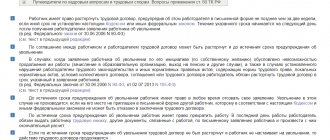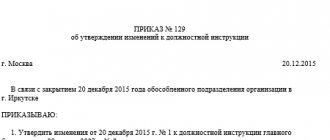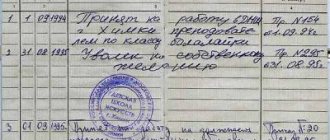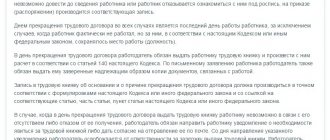Author of the article: Roman Gavrilov Last modified: January 2020 20673
When concluding an employment contract, trust between the employee and the employer is assumed and is rarely specified in a separate clause. Legal relations of an official nature are subordinate and assume that the employee follows legal orders, the order of the head of the enterprise or department. The legality of the actions of the parties to labor relations is justified by the Labor Code of the Russian Federation, special regulations of a general and local nature. Dismissal under the article “loss of trust” is permitted in exceptional cases.
Is it possible to fire an employee due to lack of confidence?
Clause 7 of Part 1 of Article 81 of the Labor Code provides, as grounds for termination of an employment contract, such guilty actions of a subordinate, in connection with which the employer loses confidence in him.
However, not any employee can be fired on this basis, but only the one who is engaged in servicing inventory items. This must be stipulated in the employment contract with the employee, his job description, as well as in a special agreement on full financial liability, which the employer has the right to conclude with some employees.
Termination of working legal relations due to mistrust occurs at the initiative of the employer. There are restrictions established by labor legislation: in particular, the dismissal of persons on vacation or sick leave, pregnant women, and minor employees is prohibited.
Grounds under the article of the Labor Code of the Russian Federation
The Labor Code does not contain a list of actions that an employer can or should regard as grounds for showing distrust of an employee. However, based on the interpretation of clause 7, part 1, art. 81 of the Labor Code of the Russian Federation, termination of legal relations under this provision is possible in the following cases:
- a subordinate has committed a culpable offense;
- he is responsible for commodity, material assets;
- the actions of the subordinate served as the basis for a loss of trust on the part of the company's management.
Dismiss the employee on the basis of clause 7, part 1, art. 81 of the Labor Code of the Russian Federation is possible provided that the actions that served as the basis for mistrust were committed not at the workplace or in connection with the performance of a work function (paragraph 2, paragraph 45 of the resolution of the Plenum of the Supreme Court of the Russian Federation of March 17, 2004 No. 2).
Who can be counted and how?
Due to the loss of trust by the employee, that is, under Art. 81 of the Labor Code of the Russian Federation (clause 7, part 1), not all employees can be fired. This rule applies to persons who:
- are financially responsible;
- committed guilty actions (inaction).
Only if these conditions are met will the termination of an employment agreement with an employee be legal. Dismissal on this basis is one of the types of disciplinary sanctions; accordingly, it requires the employer to comply with the imposition procedure.
Salesman
With whom agreements on full material (individual or collective) liability can be concluded is determined by Resolution of the Ministry of Labor of the Russian Federation of December 31, 2002 No. 85.
The position of the seller is included in this list - when performing his job duties, the seller services commodity and material assets, therefore, when hiring him, a liability agreement is concluded with him. Therefore, under certain circumstances, the seller may be fired in accordance with clause 7, part 1, art. 81 Labor Code of the Russian Federation.
Termination of legal relations with the seller will be legal only if the following conditions are met:
- monetary shortages or absence of goods must be confirmed by an inventory carried out in accordance with legal requirements;
- in addition to the shortage or absence of goods, the seller’s guilt must be established and confirmed;
- there is a cause-and-effect relationship between the actions (inaction of the seller) and the resulting consequences in the form of causing material damage to the organization.
Failure to comply with these conditions may result in the seller turning to the courts, declaring the employer’s actions illegal, reinstating the employee at work, or bringing the employer to financial or administrative liability.
Chief Accountant
Since the activities of the company's chief accountant are inextricably linked with the maintenance of material and commodity assets, he can be dismissed under clause 7 of part 1 of art. 81 of the Labor Code of the Russian Federation, if his actions cause the employer to stop trusting him. The actions that the employer identifies as the reason for the loss of trust must be culpable.
Guilt may be confirmed by the results of an audit or related inspection.
Other employees
Any employee who is engaged in the maintenance of material or commodity assets at work may be dismissed due to loss of trust if an appropriate agreement on liability has been concluded with him.
For example, when applying for a job, a warehouse manager entered into an agreement with the employer on full financial responsibility. A few months later, the employer conducted an audit and discovered a shortage in the warehouse.
We conducted an inspection - recordings from CCTV cameras and witness testimony confirmed that the warehouse manager did not always securely lock the premises when leaving work. Because of this, third parties were able to enter the warehouse and take things from there. These actions allowed the employer to fire the warehouse manager due to loss of trust.
Another case: the manager received money from the cash register to buy gifts for the team for the New Year, but lost the gifts. The employee did not enter into an agreement on full financial liability. An employer can recover damages from an employee, but it cannot be fired due to loss of trust - this is not a person who directly serves material assets.
Dismissal due to loss of trust: employer actions
To dismiss an employee on this basis, it is necessary to prove that the employee actually committed guilty actions, as a result of which he lost the trust of his employer. Accordingly, if an employer decides not to contact the police, it must conduct its own investigation.
To conduct such an investigation, a special commission is created, and the basis for its conduct may be, for example, an internal memo from the immediate superior of the offending employee.
Let us note that if during the investigation it is necessary to carry out an inventory (for example, to confirm the fact of a shortage/theft), then before carrying it out, be sure to take a receipt from the employee stating that all monetary and material assets entrusted to him have been capitalized, and those that have been disposed of, - written off.
Who shouldn't be fired?
Initiative to terminate working legal relations under clause 7, part 1, art. 81 of the Labor Code of the Russian Federation belongs to the employer, accordingly, in this case the restrictions established by law must be observed:
- Employees who are on vacation or on a certificate of incapacity for work cannot be dismissed (Part 6 of Article 81 of the Labor Code of the Russian Federation);
- Dismissal of pregnant employees is not allowed (Part 1 of Article 261 of the Labor Code of the Russian Federation);
- It is impossible to terminate the legal relationship in the absence of a financial liability agreement concluded with the employee.
The legislator establishes a ban on the dismissal of minor employees in the absence of consent from the labor inspectorate and the commission on minors' affairs.
However, liability agreements can only be signed with persons over 18 years of age. Accordingly, the dismissal of minors under clause 7, part 1, art. 81 of the Labor Code of the Russian Federation is impossible due to the fact that they will not be subjects of these legal relations.
Calculated payments upon dismissal
Having terminated the employment relationship with the employee, the manager is obliged to make a full settlement with him, which includes:
- Salary for hours worked
- Compensation for unused vacation
- Bonuses, allowances
There is no severance pay in this case. In addition, compensation for losses of the financially responsible person is withheld from estimated payments in the amount of no more than the employee’s average earnings.
If the amount of damage is greater, the procedure for compensation will be determined in court.
How the procedure works: procedure
Termination of an employment contract due to mistrust on the part of the employer is implemented as a disciplinary measure; accordingly, the requirements stipulated for bringing culprits to disciplinary liability must be observed.
Procedure for dismissal under clause 7, part 1, art. 81 of the Labor Code of the Russian Federation will be as follows:
- Having received information about unlawful actions of an employee, the employer is obliged to create a special commission, the purpose of which is to confirm the fact of violations. The commission meets on the basis of a special order issued by the head of the enterprise.
- The task of the commission is to conduct an investigation, study the circumstances of the offense committed, and conduct an inventory of commodity and material assets. When conducting an audit of a company's accountant, it may be necessary to conduct an audit.
- The employee under investigation is requested to provide an explanation, which he must provide within two working days of receipt of the request for it. Refusal to provide explanations is not grounds for exemption from disciplinary liability. In this case, the employer must draw up a statement signed by at least two witnesses stating that the employee refused to provide explanations.
- The results of the internal investigation are formalized in the form of an act signed by all members of the commission. The act indicates the conclusions reached by the commission members, evidence of the employee’s guilt, the reasons that contributed to the commission of the offense, and proposals for applying corrective measures to the guilty person.
- If the head of the enterprise agrees with the conclusions and proposals of the commission, he issues an order to terminate labor relations with the guilty person on the basis of clause 7, part 1, art. 81 of the Labor Code of the Russian Federation, which he introduces to the dismissed employee. A corresponding entry is made in the work book.
- On the last day of work, the employee is given a work book, work-related documents, and the final payment is made.
Notification
After the employee’s guilt is confirmed by an internal investigation, the head of the company has the right to decide to dismiss him. Dismissal must be preceded by sending a notice to the guilty person, drawn up in any form. The document is handed over to the employee personally against signature or sent by mail (by registered mail with notification of receipt and a list of enclosed documents).
The notice must contain the following information:
- Full name and position of the addressee;
- Title of the document;
- the main text according to which the person is subject to dismissal due to lack of confidence;
- date and signature of the head of the enterprise.
If an employee refuses to sign the notice, this must be recorded, namely, a report must be drawn up in the presence of at least two witnesses (certified). The text of the notice itself is read aloud to the person subject to dismissal.
Termination of working legal relations due to lack of confidence in an employee is permitted before the expiration of a two-week period from the date of receipt of the notification.
Drawing up an order
An order to terminate a working legal relationship is drawn up on a unified form, Form T-8, and contains the following information:
- company name, number, document date;
- title of the document (order);
- grounds for dismissal (clause 7, part 1, article 81 of the Labor Code of the Russian Federation), specified in accordance with the wording of the Labor Code of the Russian Federation;
- Full name, position of the person being dismissed;
- documents that served as the basis for termination of the working agreement (memorandum, act on the results of the inventory, act of internal investigation, explanation of the employee, etc.);
- signature of the head of the enterprise, seal of the organization;
- information about the employee's familiarization with the order.
If an employee refuses to familiarize himself with the dismissal order, the text of the document is read aloud to him, and a corresponding mark is made on the order, or an act of refusal to familiarize is drawn up, signed by two employees.
Payment to the employee
Article 140 of the Labor Code of the Russian Federation requires the employer to make a final settlement with the dismissed employee on the last working day.
Article 140 of the Labor Code of the Russian Federation. Payment terms upon dismissal
Upon termination of the employment contract, payment of all amounts due to the employee from the employer is made on the day the employee is dismissed. If the employee did not work on the day of dismissal, then the corresponding amounts must be paid no later than the next day after the dismissed employee submits a request for payment.
In the event of a dispute about the amount of amounts due to the employee upon dismissal, the employer is obliged to pay the amount not disputed by him within the period specified in this article.
In this case, the grounds for dismissal do not matter. The only difference is the money paid.
Thus, upon termination of legal relations due to loss of trust, the employee must be paid:
- salary for time worked;
- compensation for days of non-vacation, if any.
Compensation or incentive payments for dismissal on negative grounds are not paid.
What documents are needed and how to prepare them?
Regardless of the reasons why the employer terminates the legal relationship with the employee, he is obliged to issue the dismissed person with a package of documents required by law on the last day of work:
- a copy of the dismissal order;
- work book and information about the employee’s work activity;
- certificate in form 2-NDFL;
- documents relating to personalized accounting and the amount of insurance premiums paid;
- certificate of earnings for the previous 3 months;
- upon receipt of a written request - copies of official inspection reports, orders for employment, internal transfers, etc.
The employer is given 3 days from the date of receipt of a written request to issue the dismissed employee with documents related to the performance of his labor function.
Results of the commission's work
The result of the commission’s work should be a report on the results of the investigation. The document must indicate:
This is also important to know:
Dismissal of an employee of pre-retirement age
• Date of completion of the internal investigation.
• Information about the members of the commission.
• Information about the employee involved in the internal investigation.
• Statement of the circumstances that gave rise to the official investigation, taking into account the degree of guilt and gravity of guilt.
• Evidence of the employee’s guilty actions (or evidence of innocence) in the form of a list with attachments.
• Signatures of commission members.
Entry in the work book
The entry in the work book of a person dismissed due to lack of confidence must completely repeat the entry in the order on termination of legal relations and correspond to the wording set out in the Labor Code of the Russian Federation.
When filling out the book, the date and serial number of the entry, the article of the Labor Code of the Russian Federation in accordance with which the employee was dismissed are indicated, the seal of the organization and the signature of its head are affixed. The work book must be handed over to the employee personally against his signature in the journal for recording the movement of books.
If the employee is absent from the workplace or refuses to receive the book, the employer notifies him in writing of the need to pick up the book, after which he is relieved of responsibility for the employee’s late receipt of the book.
In the event of dismissal for reasons of mistrust, a corresponding entry is made in the employee’s work book.
Sample entry in the work book about dismissal due to loss of trust:
What to do if you were fired due to lack of confidence?
Dismissal due to loss of trust is one of the disciplinary measures and carries negative consequences for the employee. If a person believes that there were no grounds for terminating an employment contract with him or that during the dismissal process there were violations of the procedure or procedure for holding him accountable, he has the right to appeal the decision made by the head of the enterprise.
A statement of disagreement with the dismissal can be sent to the labor inspectorate , and a statement of claim for reinstatement to work can be sent to the court. If, after considering a complaint from a former employee, the labor inspectorate concludes that the employer committed violations, it may hold him administratively liable in the form of a fine.
In order to be reinstated at work, the dismissed person must submit a corresponding statement of claim to the court. If, based on the results of the consideration of the civil case, the court comes to the conclusion that the employer did not have grounds for dismissal or committed violations in the process of terminating legal relations, it decides to reinstate the former employee in his position.
You must contact the court before the expiration of a month from the date of receipt of the work book or familiarization with the order to terminate the legal relationship. The missed deadline can be restored by the court, but the plaintiff will have to prove that there were good reasons for missing the deadline.
Dismissal due to loss of confidence is a disciplinary measure and can be applied only to a certain category of employees with whom agreements on full financial responsibility have been concluded.
In order for the termination of legal relations to be lawful, the employer must prove that the employee committed guilty actions, and also that these actions provide grounds for further mistrust. Violations of the dismissal procedure by the employer are grounds for reinstatement of the employee to his position.
What are the consequences?
If there is a lack of confidence, the employee may face a written reprimand, compensation and dismissal. The most difficult thing for an employee is the termination of the employment relationship.
In this case, the length of service is interrupted, and this, in turn, affects the amount of payment for temporary disability: unemployment benefits are not paid for three months, then its amount is reduced. Upon loss of trust, an employee may receive a ban on holding a certain position - either temporary or for life.
An entry in the work book about such a dismissal can interfere with subsequent employment.
Even if the dismissal due to loss of trust occurred by mutual consent - damages were compensated, all necessary documents were created and submitted - then such a fact in the work history sharply reduces the employee’s chances of getting a good position.
On our portal you will find information about dismissal for disciplinary offenses, absenteeism, drunkenness, disclosure of secrets protected by law, theft and violation of labor protection requirements.
At the slightest point of controversy and the possibility of avoiding such a severance of the employment relationship, the employee must go to court, and the employer is obliged to scrupulously and thoroughly conduct an investigation and be confident in the evidence of guilt - in the case of slander and groundless dismissal, the employee has the right to significant compensation.










